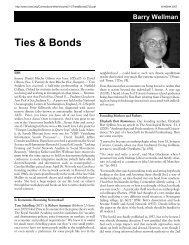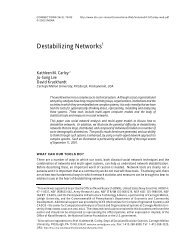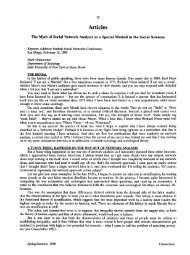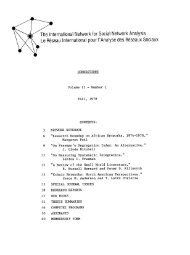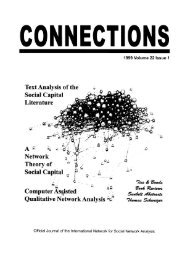(1979). Social Networks and Psychology. Connections, 2 - INSNA
(1979). Social Networks and Psychology. Connections, 2 - INSNA
(1979). Social Networks and Psychology. Connections, 2 - INSNA
Create successful ePaper yourself
Turn your PDF publications into a flip-book with our unique Google optimized e-Paper software.
- 81 -URBAN SOCIOLOGY IN BRITAIN AND THE STUDY OF SOCIAL NETWORKSChristopher G . Pickvance (U . of Kent at Canterbury)The third biennial Centre for Environmental Studies conference entitled 'Urban Change <strong>and</strong> Conflict' washeld at Nottingham University in January <strong>1979</strong> . It provided an opportunity to assess trends in British urbansociology in the last five years .In brief, it can be said that during this period a new paradigm has become accepted in the field .The first conference, at York in 1975, had the implicit function of introducing a Marxist perspective,current at that time mainly in French, German <strong>and</strong> Italian writing, to British urban sociology . The atmospherewas one of confrontation . Ray Pahl, the senior urban sociologist present <strong>and</strong> promoter of the "urbanmanagerialist" perspective (see Whose City) acted as 'lightning conductor' for the criticism unleashedagainst the 'old guard' . This perspective had focussed attention on the actions of local authority officials(e .g . town planners, housing managers) <strong>and</strong> private sector actors (e .g . building society managers, l<strong>and</strong>lords)as determinants of people's life chances . It was criticized as cutting short the chain of explanation prematurely,by failing to ask about the forces constraining local authorities, <strong>and</strong> the private sector - i .e .of failing to relate 'urban' phenomena to the functioning of British capitalism <strong>and</strong> the role of the statewithin it . This criticism was ambiguous : some critics implied that 'urban managers' or 'gatekeepers' shouldnot be objects of study within a radicalized urban sociology, whereas others saw no reason why they shouldn'tprovided the wider forces within which they acted were brought into the analysis .At the 1975 conference the debate about the new perspective probably seemed cliquish to many participants .This was probably inevitable given the fact that access to the statements of the new perspective was restrictedto those who could read them in the original or to members of various networks through which Englishtranslations passed . The publication in 1976 of my collection Urban Sociology :Critical Essays <strong>and</strong> in 1977of Harloe's collection Captive Cities <strong>and</strong> Castells's The Urban Question put an end to this phase . (The Proceedingsof the two Conferences on Urban Change <strong>and</strong> Conflict, which include both papers <strong>and</strong> discussion,are also very well worth reading .)The result was that by the time of the 1977 conference, <strong>and</strong> a fortiori by January <strong>1979</strong>, the questionsat issue in the debate were generally understood <strong>and</strong> it appeared that the new perspective had won the day .In fact, at the <strong>1979</strong> conference there was a disturbing complacency about the proceedings as though peoplefelt that theoretical debates (Marx v . Weber) were a thing of the past <strong>and</strong> that the point was to get onwith the work of 'normal science' .However this account needs to be amplified . First, no intellectual debate proceeds independent of itssocial surroundings . The crisis phase of capitalism <strong>and</strong> its reflection in Britain in the selective cuttingof government social expenditures revealed the fragility of a welfare state that people had previously beenable to view as an untouchable part of the modern state . The revelation of the dependence of the welfarestate on the state of the economy <strong>and</strong> of government responses to preserve the conditions of capitalaccumulation at all costs, greatly facilitated acceptance of a perspective which placed capital accumulation<strong>and</strong> the role of the state at its centre . At the same time, the widespread rise in social protest providedfertile ground for a perspective which emphasised class struggle in the broadest sense .Second, it is not the case that the British intellectual scene was a tabula rasa on which this newperspective was inscribed . One of the most interesting developments has in fact been what can be calledthe "British response" to the "French School" - though such labels inevitably turn the issue into a replayof the Battle of Hastings . While it is true that British Marxist urban sociology was absent as an importantcurrent, Marxist-inspired writing in the fields of history <strong>and</strong> general sociology was not . The resultis that there has been a widespread rejection of 'structuralist' elements of French writers such as Castells<strong>and</strong> Poulantzas, deriving from Althusser . (n .b . These elements were not to be found in the writings ofLojkine, Preteceille <strong>and</strong> other 'urban' proponents of the 'state monopoly capitalism' thesis - against which,however, other criticisms developed .)Given the ubiquity of the term 'structure' <strong>and</strong> its necessity - in my view - to any social scienceanalysis, it should be made clear that the objection was to the abstract level at which the structures werelocated <strong>and</strong> to the absence of analysis of the processes by which they operated <strong>and</strong> changed . It was theclassic criticism directed against static analysis in economics, <strong>and</strong> some versions of functionalism insociology, that the way in which major change came about <strong>and</strong> the role of political forces in bringing itabout had become excluded . Either the underlying 'structures' had a formal <strong>and</strong> timeless character <strong>and</strong>reality was ignored or seen as a mechanical 'playing out' of the structural contradictions they containedor else arbitrary connexions were made between current events <strong>and</strong> structural contradictions . And asRanciere (1974) argued such arbitrary relations led to political impotence <strong>and</strong> a retreat to the ivory tower .This critique of "structuralist" Marxism <strong>and</strong> its disdain for analysing political process was made bothin France <strong>and</strong> Britain . In each country it had specific origins . In France the rise in strength of the



